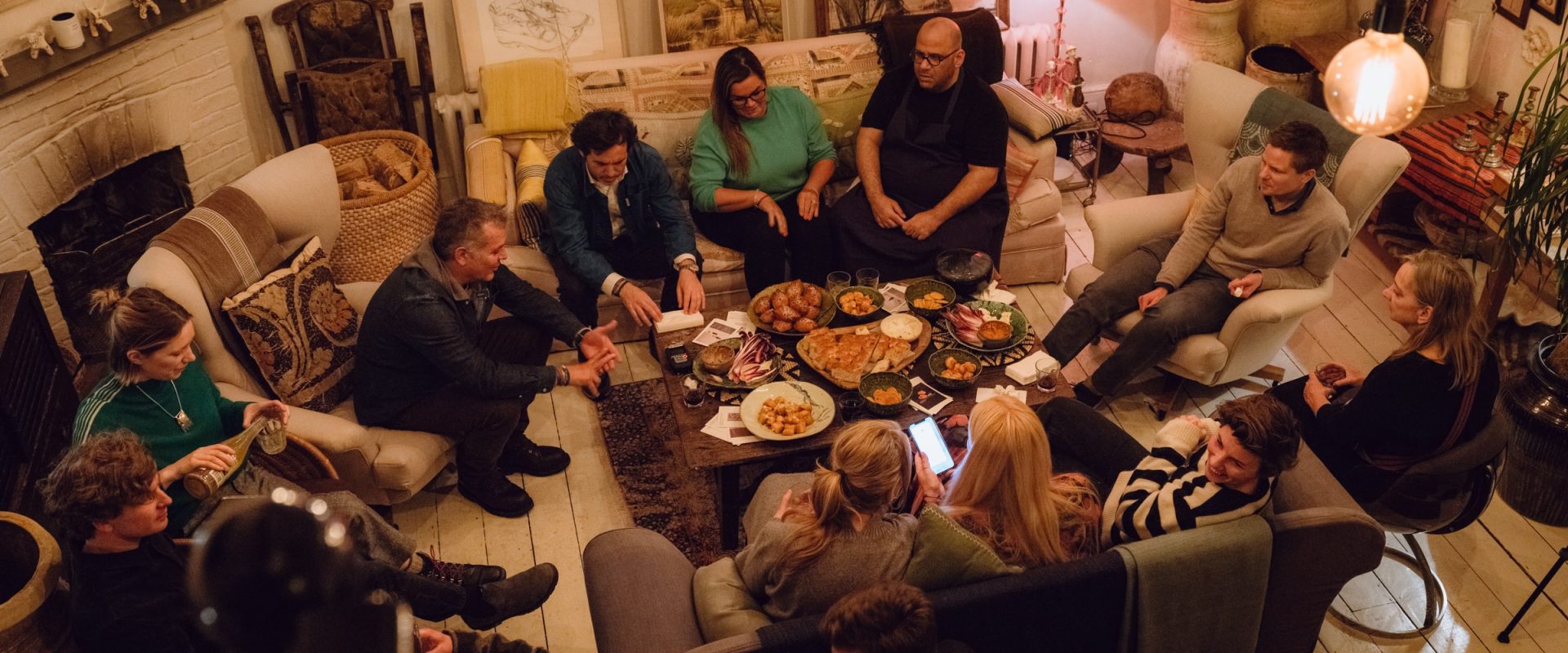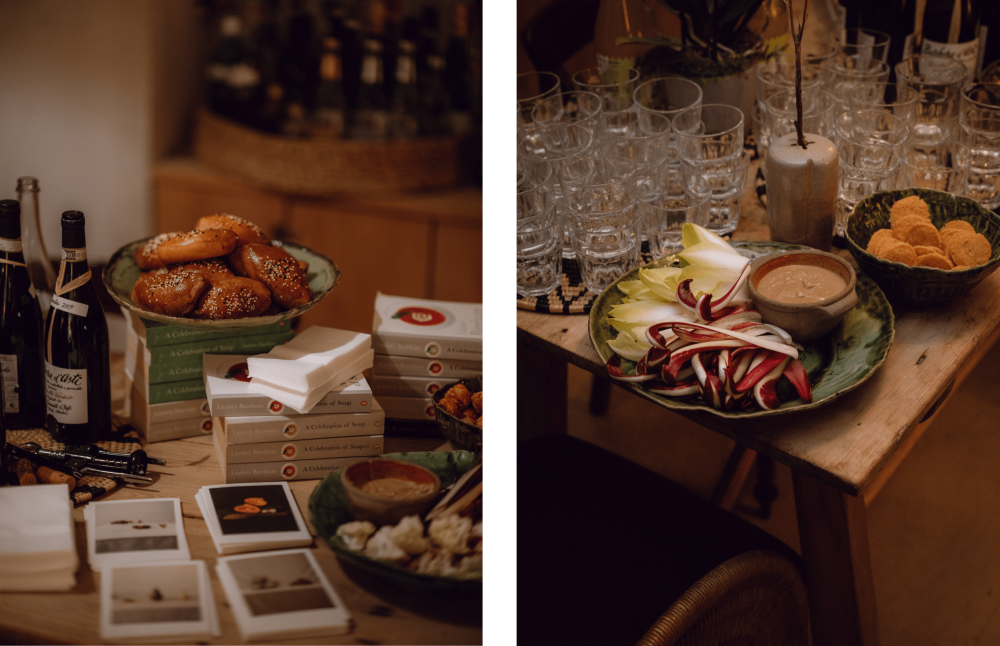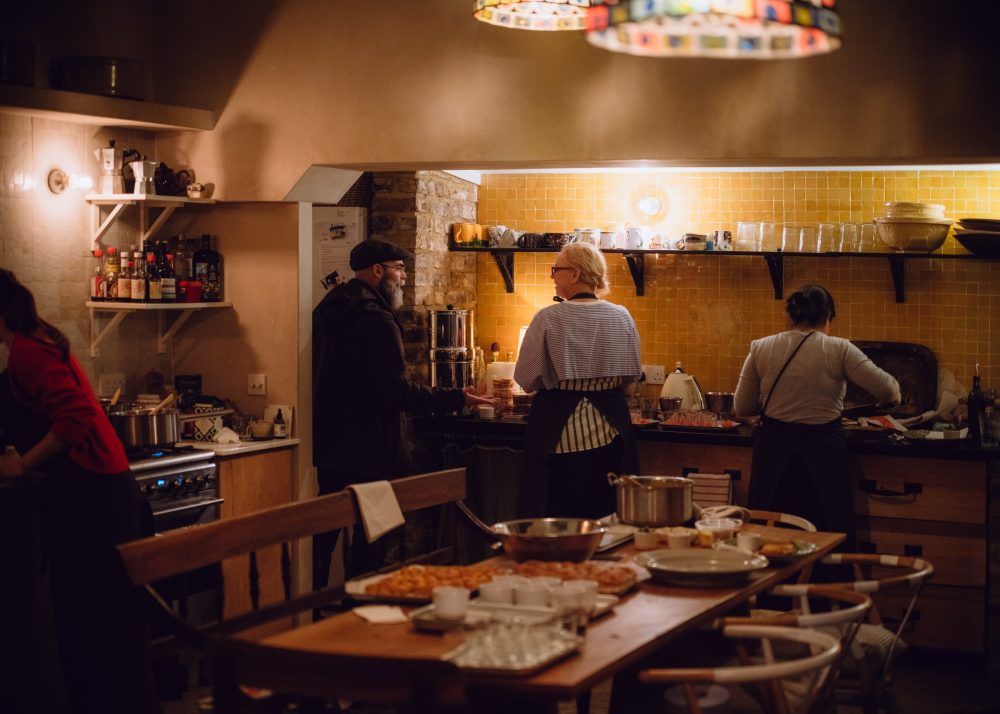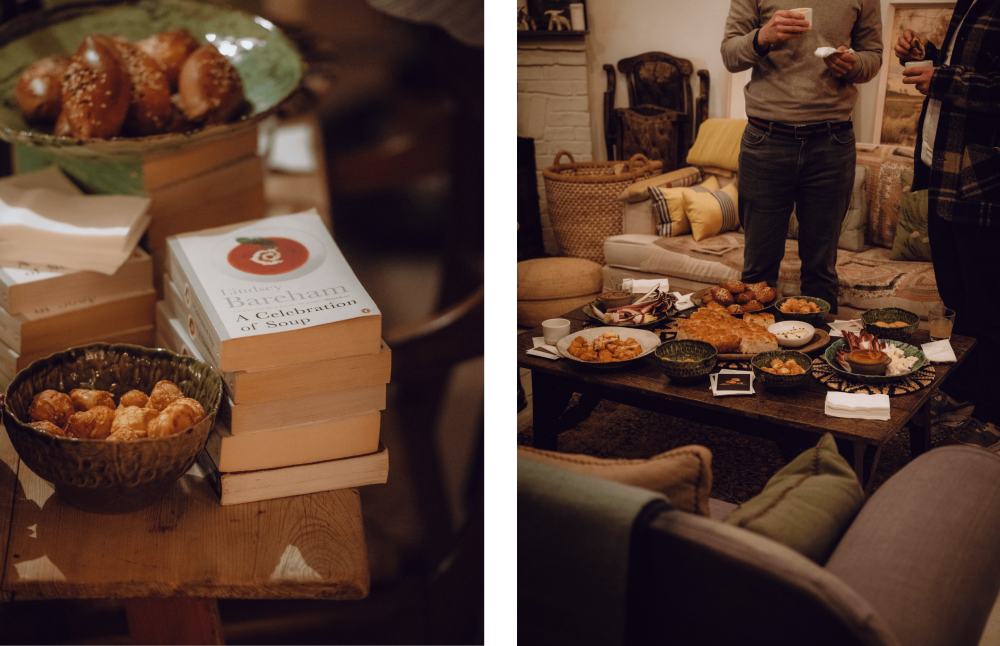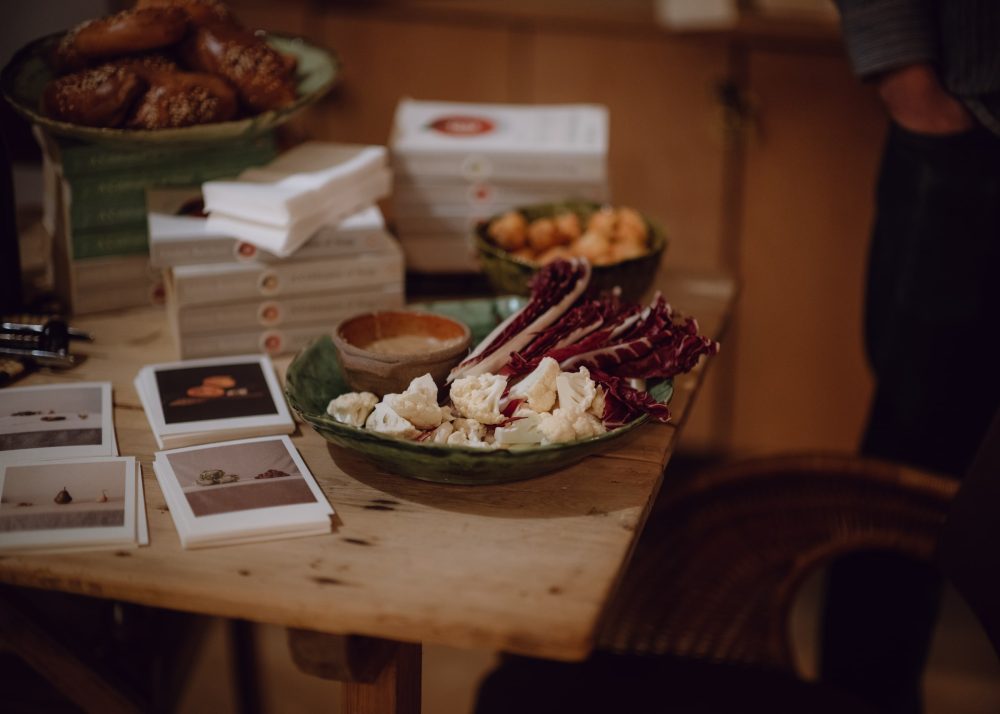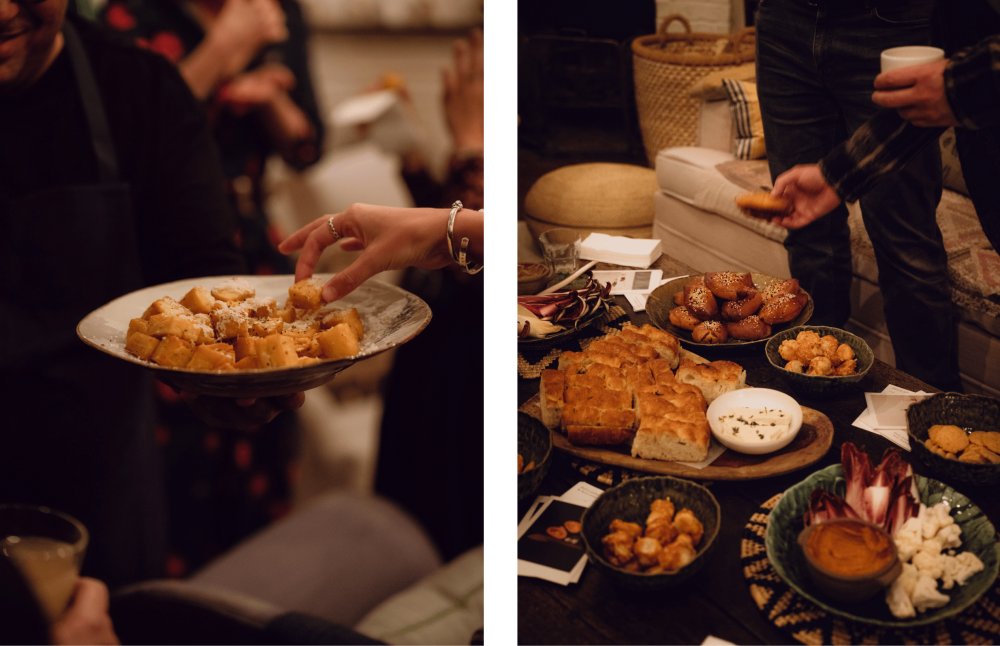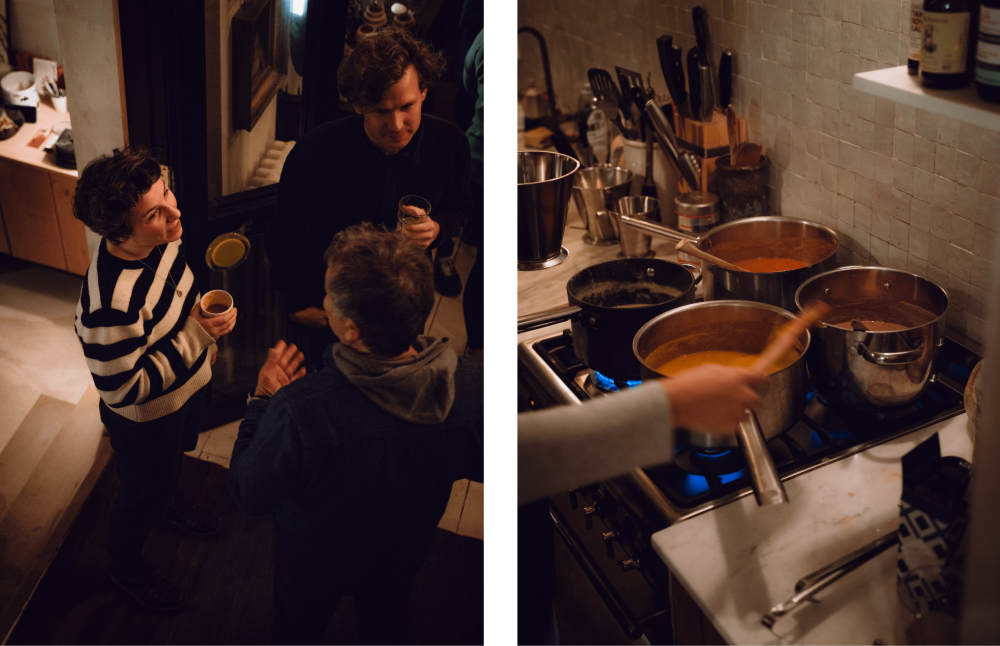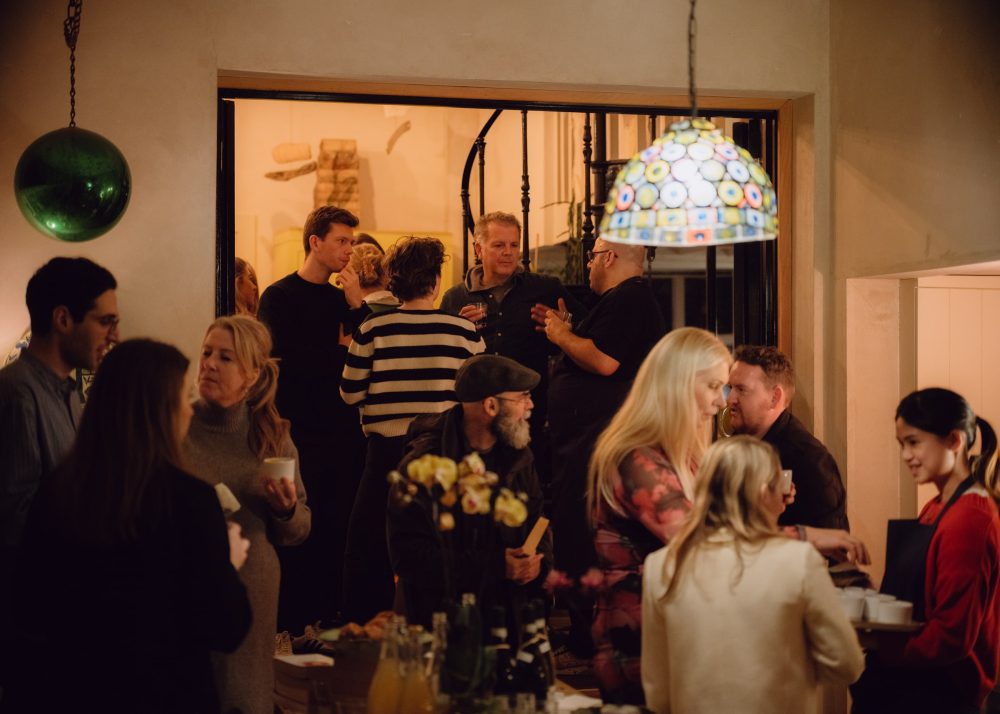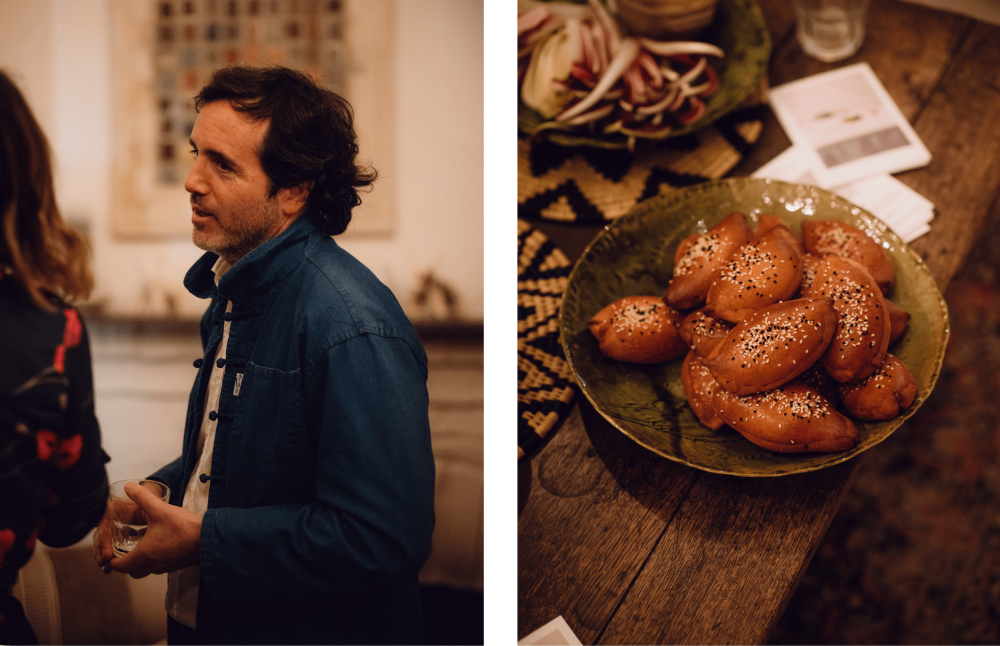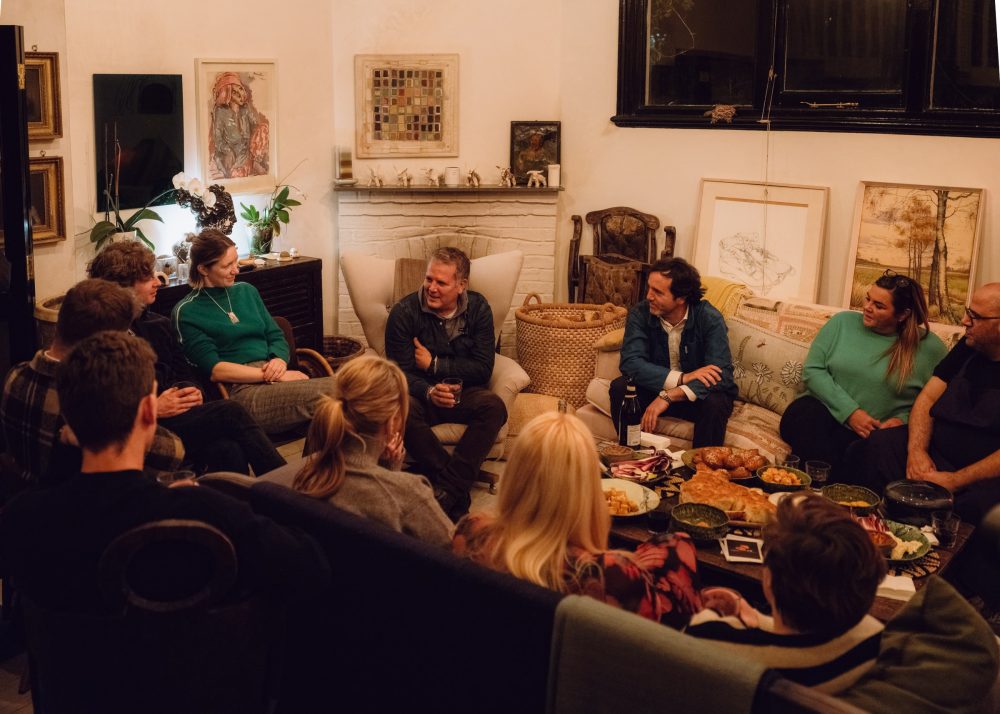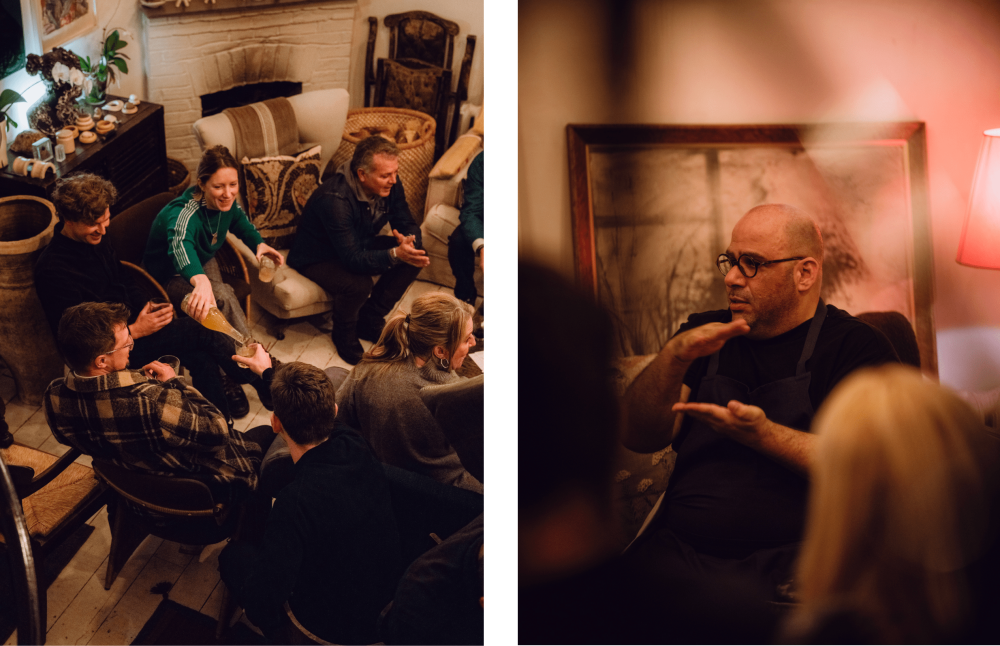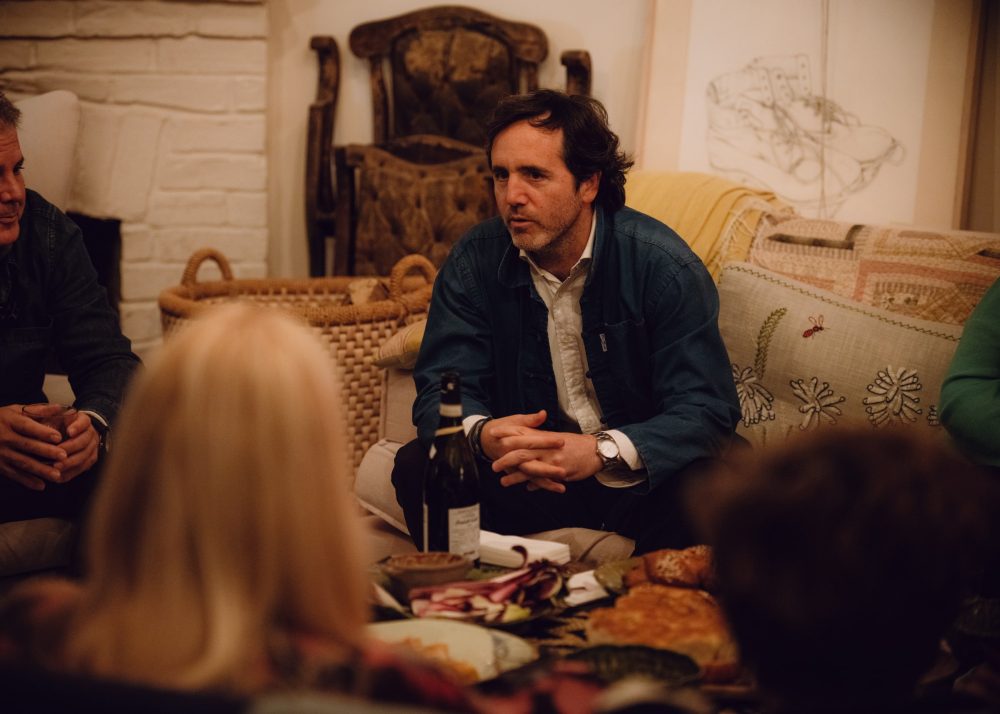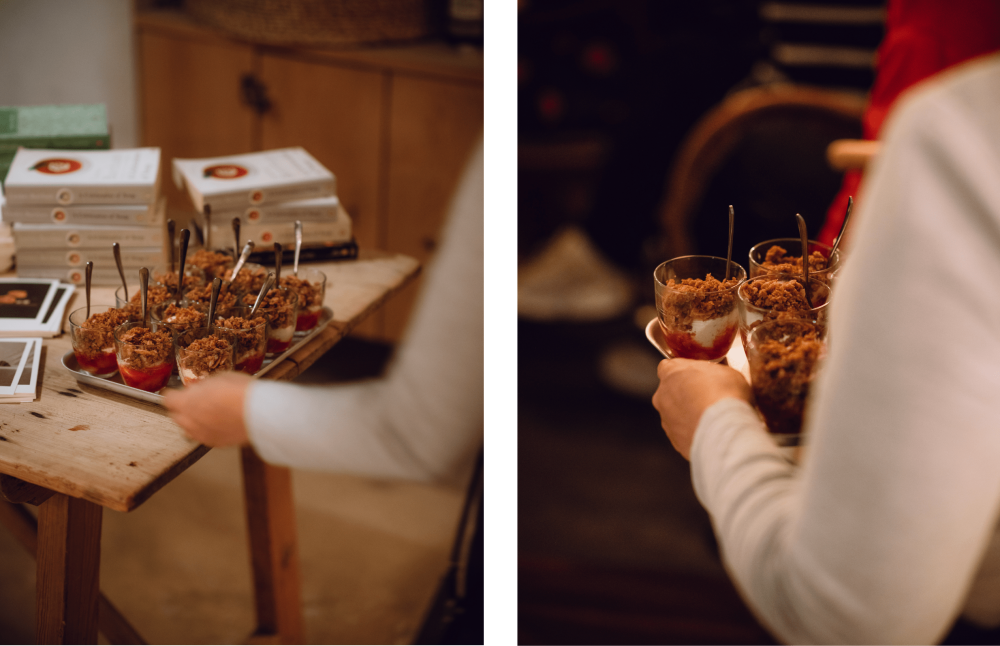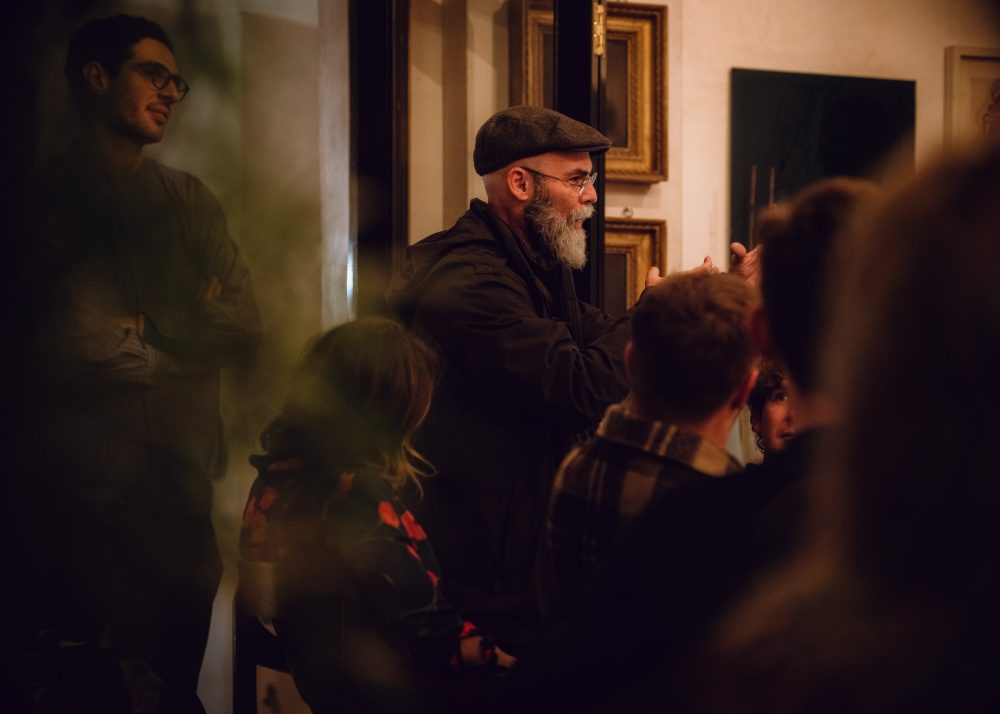Words Charlie Monaghan
Photography Elliot Sheppard
We think the Natoora soups you can find in our bakeries now are one of the joys of winter: a warming bowl of well-seasoned, fresh produce, cooked simply and beautifully. But there is an untold story about soup that goes far beyond its ability to fight off the chills. And so we gathered with our friends at Natoora on a winter’s evening recently to discuss how our soup collaboration is best understood as an expression of our shared mission to alter the food system at scale…
‘Of soup and love, the first is the best,’ said the 18th-century philosopher Thomas Fuller, to which we say: ‘Are they not but the same thing?’ Soup, one of our oldest and most elemental foods, is, when made properly, an act of love: a sustaining, nutritious, reviving food that we adore only the more for its compatibility with that other essential of the human diet: bread. If early life emerged from a primordial soup of organic matter billions of years ago, modern life, for us, finds its strength and nourishment from a hot bowl of well-made soup and a few slices of sourdough.
Yet we admit that it is not always easy to get excited about soup. Perhaps it is its everydayness, or something about its liquified form, that makes soup at once too quotidian and yet too abstract to prompt further investigation. However, as we know from being devotees to Lindsey Bareham’s masterful and ever-inspirational bible to the stuff, A Celebration of Soup, it is possible to get excited about soup when the right stories are told. And so we recently held our own celebration of soup with our partners at Natoora, the makers of the soups you will find in our bakeries now, in which we came together to discuss the role soup plays in our collective and shared mission to make positive changes to the food system.
Here is an edited conversation about why and how soup matters between Tom Molnar, the CEO and co-founder of GAIL’s and Franco Fabrini, the CEO and founder of Natoora, with input from Anomarel Ogenm, our master baker, and Roy Levy, our creative director.
‘Of soup and love, the first is the best’ – Thomas Fuller
Pictured above, clockwise from top: a busy kitchen prepares the evening’s supper. Guests enjoying canapés that included cheese puffs and chickpea panisee. Second-hand copies of Lindsey Bareham’s influential A Celebration of Soup were sourced for guests to take with them.
Tom: “When did we first meet Franco, 20 years ago? It was when you first started Natoora. A few other people were doing similar things to us and we’d meet every month for a BBQ. None of us knew what we were doing but we all supported each other and told each other to keep going. It’s interesting to come together again like this 20 years later.
“Franco and I share a belief that there is a lot more appetite for good food grown and made responsibility than there are entrepreneurial people and ventures providing it. We both feel there is a lot of work for us to get done, and we have a genuine opportunity to shape a food system that isn’t working properly.”
“I always say I started Natoora out of a selfish need for better quality produce”
Franco: “I always say I started Natoora out of a selfish need for better quality produce, which I couldn’t find. I grew up in Italy, Argentina and Egypt in what I would say were pre-industrial food systems, but when I went to live in New York, I couldn’t find flavourful, in-season produce, despite knowing it was out there. At that time, in the late 1990s, even the restaurants didn’t seem to be getting, say, tomatoes from the Amalfi coast.
“I remember being in a high-end deli in Manhattan and a woman was asking for peaches while it was snowing outside. I just thought, ‘What the hell? Why do you want to eat peaches now? You should be wanting pumpkin soup!’ That’s when I knew I needed to do something, and it took five years from then to launch Natoora.”
Pictured above: as guests filled in, both soup and conversation bubbled away.
Tom: “We have to find more ways of getting seasonal produce to people, which is what we like about soup. We know as bakers that ingredients are super important and if you have great sourcing you’re 90 per cent of the way there. Then you just need to do a bit of work, but there should be a sense of just taking something out of the ground and feeding it to someone.
“Recently we were at Sharpham Park Farm, who grow the spelt we use, and Ano, our master baker, looked at the field and said, ‘I want to put that all in a loaf’. I love that idea of more directly engaging with whatever a field can grow over the course of a year but putting it into a loaf – it’s more true to what nature is there to provide.”
Ano: “You know that idea first came from soup! The guy who taught me how to make soup had a pot in the middle of the kitchen, and something from everything that got made went into the pot. The whole concept is that there it is one expression of what was made that day, which is also the idea for the field loaf. It started with soup.”
“Flavour is an expression of how produce is grown”
Pictured above, clockwise from top: guests chat before the talk. Lamb and beef buns, which were created to pair well with Natoora’s carrot and maple soup. Franco Fubini, founder of Natoora.
Roy: “Franco, with GAIl’s we started as an artisanal bakery supplying high-end restaurants but, 20 years ago, we found a way to democratise amazing produce and baking by bringing what we were doing to the high street, and we did that over and over again until things like sourdough became familiar and commonplace for people. How do we do that with produce? How do we bring it down a notch and make it more accessible?”
Franco: “For us, it always comes back to flavour. There are lots of reasons why flavour leads to good outcomes, but I think from the standpoint of asking, ‘How do we get people to change and make better food choices?’ flavour is a real visceral conduit for that message. You can tell me all about that bagna càuda and radicchio, but if I taste it and love it, that’s going to make me change because I’ll want that taste again.
“For most of us, if we taste something incredible, we’ll respond positively, and you’ll want that amazing peach again rather than one that tastes like cardboard. Flavour is an expression of how produce is grown – if things are farmed properly in well-looked-after land, they taste much better than their intensively farmed counterparts, so that’s how you get people to connect with great produce.
“Soup is a good answer to your question, as it is very comforting and familiar. It holds a special place in our food memories – just think of chicken soup. It’s a very simple, humble way to communicate the flavour, quality and integrity of produce. The approach we’ve always had in the way we developed our prepared food is to keep things as simple as possible because it follows our sourcing ethos, which is flavour-driven. By doing soups that are very pure, where you can taste the Delica pumpkin or the Jerusalem artichoke, you can really drive the message to people.
Pictured above, clockwise from top: Tom and Franco on all things soup. Roy Levy, our creative director, steered the conversation. Being January, Wildpress apple juice seemed to be flowing more freely than wine.
“The right partners who are aligned in the food system, who feel comfortable with scale, are fundamental.”
Tom: “And where there is flavour, there is nutrition. I think it’s about sheer bloodymindedness too: I don’t care if the world wants me to put more sugar or salt into food – I’m going to stick to my plan. It’s not giving up! If we believe the whole field can be in a loaf, that flavour does matter, and we stick with it, and educate people who are hungry for information, then that will change things. There’s no silver bullet – we just need to show up over and over again.”
Franco: “We need change to happen quickly in the food system, but unfortunately we can’t always move that quickly. We’re not Facebook; we can’t scale by turning on some more servers. You really need to grow the food, then it needs to be distributed, so scaling in our industry just takes longer. You can’t just do five times the amount of Delica pumpkin from one year to a next, unless you really plan for it, and also build that demand with the consumer. It all takes time, but equally that pace grounds you to nature and does a lot of good.”
Tom: “Yeah the great part is you can’t work ahead of nature. Once it gets moving, it has a speed limit.”
On the menu
Bagna càuda with crudités
Cheese puffs
Lincolnshire Poacher cheese crackers
Panisse with shaved Pecorino Sardo
Natoora’s Winter ’24 soups
Cheese and leek brioche toastie
Spiced beef and lamb buns
Vanilla-infused cheesecake with blood oranges and spelt granola.
Guasti Barbera d’Asti Superiore Boschetto Vecchio Cru 2019
Wildpress apple juice
Franco: “Definitely. But there is a big movement that’s in our favour, so it’s a matter of continuing to build on the education. The biggest challenge we face as an organisation is getting consumers to know what to do with an artichoke so that they then buy an artichoke. Or if they don’t know what to do with it, how can we make soup out of it so they can at least appreciate it and have that level of impact?
“The more we can educate consumers that every food choice has an impact – good or bad – the more change we’ll see. And, for me, the key educational tool is flavour because it emotionally connects with people. Behind properly flavourful food is good farming practices, better nutrition, better environmental impact and food that’s better value for me and my health.
“The really exciting and interesting stuff for us is how do we scale what we’re doing, and how do we have impact at scale? GAIL’s has a huge and loyal customer base, so there is a lot of opportunity for positive impact. I realised early on with Natoora that rather than trying to fight the supermarkets, we needed to work with them because they are where most people still buy their food from.
“In supermarkets you have this infrastructure and these locations that are fundamental to how food goes out to consumers, and I knew we needed to tap into that by partnering with them. That’s where the Ocado partnership came from, and that’s why it’s exciting partnering with GAIL’s because the scale you’re at, the volume you can move, and the growth ahead of you, is huge.
“The right partners who are aligned in the food system, who feel comfortable with scale, are fundamental. There is this feeling that small is good, big is bad, but you’re not going to change the world like that. The little bakeries doing something super artisan are fantastic, but they aren’t going to change things at scale, even if it’s great that they are there.”
Pictured above: Vanilla-infused cheesecake with blood oranges and spelt granola making its way around the crowd.
Tom: “I like to think of it as a network of people trying to do better things, all connected to each other – that’s more powerful. We’re part of a system that can represent part of the solution, but we need to work together.”
Franco: “For sure. In our industry, when you find a like-minded business that sees the world in the same way as you do, it’s almost a matter of responsibility to band together because the challenge is way too big to face alone: how do you get consumers to stop buying industrially produced food? It’s massive, and there aren’t many people out there trying to find solutions. A lot of the businesses in our world aren’t thinking about how to reinvest in the system and deliver positive impact – they are just selling food like a commodity.”
Pictured above: Anomarel Ogen, our master baker who leads our baking for GAIL’s, explaining how his approach to baking and sourcing grains was inspired by soup.
“The challenge is way too big to face alone”
Tom: “Yes, and we have to build supply chains that are going to bring about positive changes. I always use the coffee industry as a good example of an industry that took something that was hugely commoditised, de-commoditised it, and made sure the whole supply chain thought really hard about their role. Now, no one is buying a 50p styrofoam cup of coffee anymore – it tastes bad, you know it’s wrong. And I think wheat, fruit and veg, the potential is there. Commoditising everything doesn’t make sense because we lose any incentive in the system to do something well. As a society, we went for quantity for so long, which was an amazing goal, but now we need to think about quality.”
Ano: “The good news is that we have a choice. In the context of human history, our industrial food system is a relatively new phenomenon, and for most of the time we’ve been on this planet we have lived harmoniously with the natural world. It will take a lot of work to get back to that, but it’s not beyond us.”
